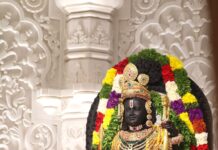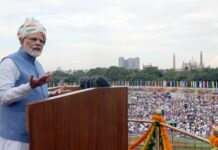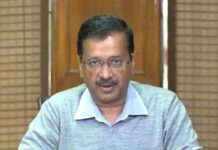New Delhi (IANS): Prime Minister Narendra Modi Sunday expanded his council of ministers, inducting 21 new faces, including four of cabinet rank, in a bid to consolidate the gains of the Lok Sabha elections by giving representation to various regions and communities, while also reshuffling some key portfolios.
Manohar Parrikar is the new defence minister, Suresh Prabhu has been given charge of railways, Jagat Prakash Nadda is the new health and family welfare minister, while Birender Singh succeeds the late Gopinath Munde as the rural development and panchayati raj minister.
The 45-member Modi ministry Sunday added to it four cabinet ministers, three ministers of state with independent charge, and 14 ministers of state (MoS).
Portfolios of the new ministers were announced late Sunday night ahead of the first meeting of the expanded ministry slated for Monday. There was also a reshuffle of portfolios.
Finance Minister Arun Jaitley, who relinquishes his additional charge of defence to Parrikar, has been now given information and broadcasting, currently held by Parakash Javadekar as a minister of state (independent charge).
D.V. Sadananda Gowda was moved from railways to law and justice, held by Ravi Shankar Prasad, who now just has the portfolio of communications and information technology. Harsh Vardhan has been shifted from health to science and technology, currently held by minister of state (independent charge) Jitendra Singh.
The much-anticipated first ministry expansion was marred with ally Shiv Sena calling off participation in the government at the last minute, exacerbating their already strained ties.
Prabhu, who was a minister in the first national Democratic Alliance government, was sworn in after he quit the Shiv Sena and joined the Bharatiya Janata Party (BJP).
In Mumbai, Shiv Sena chief Uddhav Thackeray described Prabhu’s joining the BJP as “unfortunate” but indicated that Anant Geete, party’s representative in the Modi government, will continue for the time being.
Thackeray put a condition that his party will sit in opposition in Maharashtra if BJP takes support of the Nationalist Congress Party to prove its majority in the state assembly Nov 12.
The Sena at the last minute recalled Anil Desai, who it had nominated for induction in the union ministry. According to reports, Desai arrived in Delhi for the oath-taking ceremony but was ordered to return.
Parrikar, who is widely tipped to get the defence portfolio, was the first to be administered oath by President Pranab Mukherjee at the Durbar Hall of Rashtrapati Bhavan and was followed by Nadda, who is known to be close to Modi and party chief Amit Shah.
Giriraj Singh, 61, who courted controversy with his comment that “those who oppose Narendra Modi should go to Pakistan” and was also booked for the hate speech, got a place as as minister of state.
Jayant Sinha, the IIT-Delhi and Harvard-educated MP from Hazaribagh in election-bound Jharkhand, is among the professionals inducted in the ministry as a balancing act to induction of state leaders with caste or community base.
The ministry expansion also signalled BJP’s efforts to consolidate its gains in the states it had done well in the Lok Sabha elections and give representation to various dominant castes and communities to expand its social base in view of the assembly elections over the next few years.
Keeping in mind next year’s elections in Bihar which are crucial for the BJP, the council has three new faces from the state – Rajiv Pratap Rudy (MoS independent charge), Ram Kirpal Yadav and Giriraj Singh (both MoS), all belonging to different and numerically significant communities. Union ministers Ram Vilas Paswan and Ravi Shankar Prasad are also from Bihar.
Uttar Pradesh, another state crucial for the BJP, got four new berths – Mahesh Sharma, a doctor who is the MP from Gautam Buddh Nagar (Noida); Mukhtar Abbas Naqvi, who is a Rajya Sabha member; Ram Shankar Katheria, the Agra MP; and Sadhvi Niranjan Jyoti.
Even with Sunday’s expansion, Modi’s ministry is leaner than those headed by Manmohan Singh. Officials said that Singh’s ministry stood at 78 after its final reshuffle while the previous NDA had expanded even beyond that.
Modi also brought into his ministry the party’s known Muslim face in Naqvi, adding to Najma Heptullah, who is minority affairs minister.
He also added to the representation of women by inducting Sadhvi Niranjan Jyoti, BJP MP from Fatehpur in Uttar Pradesh, to take their number to eight.
The youngest MP inducted in the ministry Sunday is well-known singer Babul Supriyo Baral, the only face in the ministry from West Bengal where the BJP wants to consolidate after recent gains. The Asansol MP was inducted as a minister of state.
The only NDA ally to get a berth in Sunday’s expansion was Telugu Desam Party (TDP) Rajya Sabha MP, Y.S. Chowdary as an MoS.
Apart from Prabhu, the BJP inducted party MP Hansraj Ahir from Maharashtra where the party got success in the recent assembly polls.
Gujarat got new faces – Haribhai Parthibhai Chaudhary, and Mohanbhai Kalyanjibhai Kundarya, while Olympian Rajyavardhan Singh Rathore and Sanwar Lal Jat were inducted from Rajasthan. Vijay Sampla, BJP Hoshiarpur MP, was inducted as MoS.
LIST FROM MODI’S WEBSITE
Prime Minister Shri Narendra Modi: Personnel, Public Grievances and Pensions; Department of Atomic Energy Department of Space; All important policy issues and all other portfolios not allocated to any Minister
CABINET MINISTERS
1. Shri Rajnath Singh: Home Affairs
2. Smt. Sushma Swaraj: External Affairs, Overseas Indian Affairs
3. Shri Arun Jaitley: Finance, Corporate Affairs, Information & Broadcasting
4. Shri M. Venkaiah Naidu: Urban Development, Housing and Urban Poverty Alleviation, Parliamentary Affairs
5. Shri Nitin Jairam Gadkari: Road Transport and Highways, Shipping
6. Shri Manohar Parrikar: Defence
7. Shri Suresh Prabhu: Railways
8. Shri D.V. Sadananda Gowda: Law & Justice
9. Sushri Uma Bharati: Water Resources, River Development and Ganga Rejuvenation
10. Dr. Najma A. Heptulla: Minority Affairs
11. Shri Ramvilas Paswan: Consumer Affairs, Food and Public Distribution
12. Shri Kalraj Mishra: Micro, Small and Medium Enterprises
13. Smt. Maneka Sanjay Gandhi: Women and Child Development
14. Shri Ananthkumar: Chemicals and Fertilizers
15. Shri Ravi Shankar Prasad: Communications and Information Technology
16. Shri Jagat Prakash Nadda: Health & Family Welfare
17. Shri Ashok Gajapathi Raju Pusapati: Civil Aviation
18. Shri Anant Geete: Heavy Industries and Public Enterprises
19. Smt. Harsimrat Kaur Badal: Food Processing Industries
20. Shri Narendra Singh Tomar: Mines, Steel
21. Shri Chaudhary Birender Singh: Rural Development, Panchayati Raj, Drinking Water and Sanitation
22. Shri Jual Oram: Tribal Affairs
23. Shri Radha Mohan Singh: Agriculture
24. Shri Thaawar Chand Gehlot: Social Justice and Empowerment
25. Smt. Smriti Zubin Irani: Human Resource Development
26. Dr. Harsh Vardhan: Science and Technology, Earth Sciences
MINISTERS OF STATE
27. General V.K. Singh: Statistics and Programme Implementation (Independent Charge), External Affairs, Overseas Indian Affairs
28. Shri Inderjit Singh Rao: Planning (Independent Charge), Defence
29. Shri Santosh Kumar Gangwar: Textiles (Independent Charge)
30. Shri Bandaru Dattatreya: Labour and Employment (Independent Charge)
31. Shri Rajiv Pratap Rudy: Skill Development & Entrepreneurship (Independent Charge), Parliamentary Affairs
32. Shri Shripad Yesso Naik: AAYUSH (Independent Charge), Health & Family Welfare
33. Shri Dharmendra Pradhan: Petroleum and Natural Gas (Independent Charge)
34. Shri Sarbananda Sonowal: Youth Affairs and Sports (Independent Charge)
35. Shri Prakash Javadekar: Environment, Forest and Climate Change (Independent Charge)
36. Shri Piyush Goyal: Power (Independent Charge), Coal (Independent Charge), New and Renewable Energy (Independent Charge)
37. Dr. Jitendra Singh: Development of North Eastern Region (Independent Charge), Prime Minister’s Office, Personnel, Public Grievances & Pensions, Department of Atomic Energy, Department of Space
38. Smt. Nirmala Sitharaman: Commerce and Industry (Independent Charge)
39. Dr. Mahesh Sharma: Culture (Independent Charge), Tourism (Independent Charge), Civil Aviation
40. Shri Mukhtar Abbas Naqvi: Minority Affairs, Parliamentary Affairs
41. Shri Ram Kripal Yadav: Drinking Water & Sanitation
42. Shri Haribhai Parthibhai Chaudhary: Home Affairs
43. Shri Sanwar Lal Jat: Water Resources, River Development & Ganga Rejuvenation
44. Shri Mohanbhai Kalyanjibhai Kundariya: Agriculture
45. Shri Giriraj Singh: Micro, Small & Medium Enterprises
46. Shri Hansraj Gangaram Ahir: Chemicals & Fertilizers
47. Shri G.M. Siddeshwara: Heavy Industries & Public Enterprises
48. Shri Manoj Sinha: Railways
49. Shri Nihalchand: Panchayati Raj
50. Shri Upendra Kushwaha: Human Resource Development
51. Shri Radhakrishnan P.: Road Transport & Highways, Shipping
52. Shri Kiren Rijiju: Home Affairs
53. Shri Krishan Pal: Social Justice & Empowerment
54. Dr. Sanjeev Kumar Balyan: Agriculture
55. Shri Manuskhbhai Dhanjibhai Vasava: Tribal Affairs
56. Shri Raosaheb Dadarao Danve: Consumer Affairs, Food and Public Distribution
57. Shri Vishnu Deo Sai: Mines, Steel
58. Shri Sudarshan Bhagat: Rural Development
59. Prof. (Dr.) Ram Shankar Katheria: Human Resource Development
60. Shri Y.S. Chowdary: Science and Technology, Earth Science
61. Shri Jayant Sinha: Finance
62. Col. Rajyavardhan Singh Rathore: Information & Broadcasting
63. Shri Babul Supria (Babul Supriyo) Baral: Urban Development, Housing and Urban Poverty Alleviation
64. Sadhvi Niranjan Jyoti: Food Processing Industries
65. Shri Vijay Sampla: Social Justice & Empowerment














